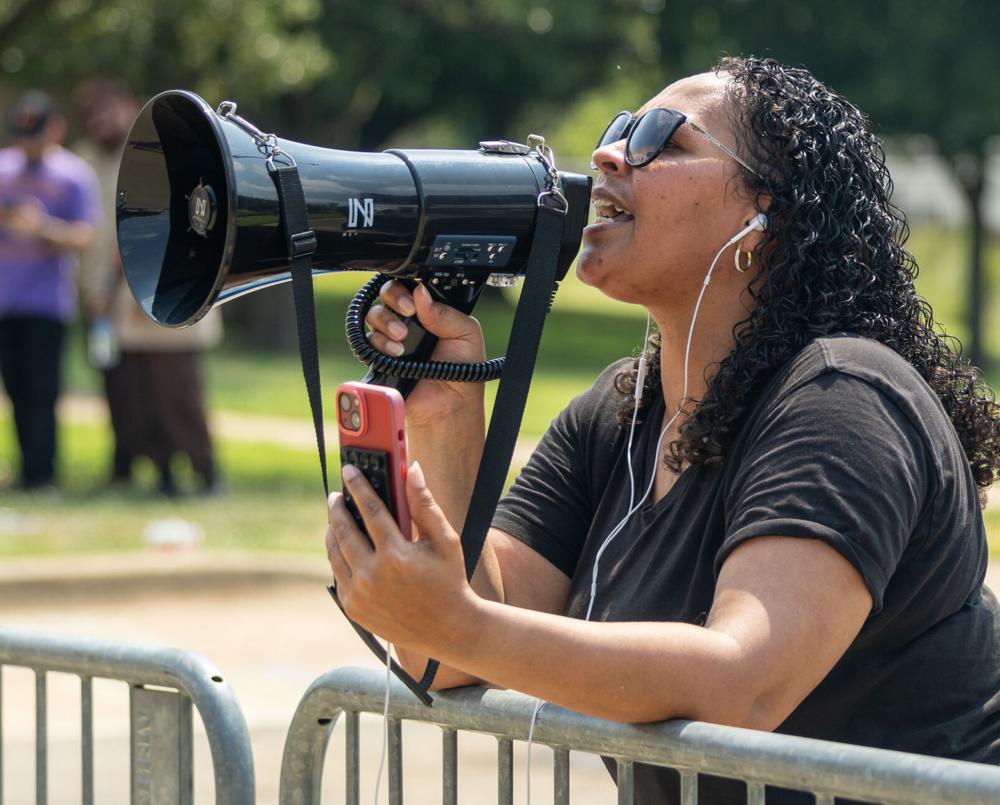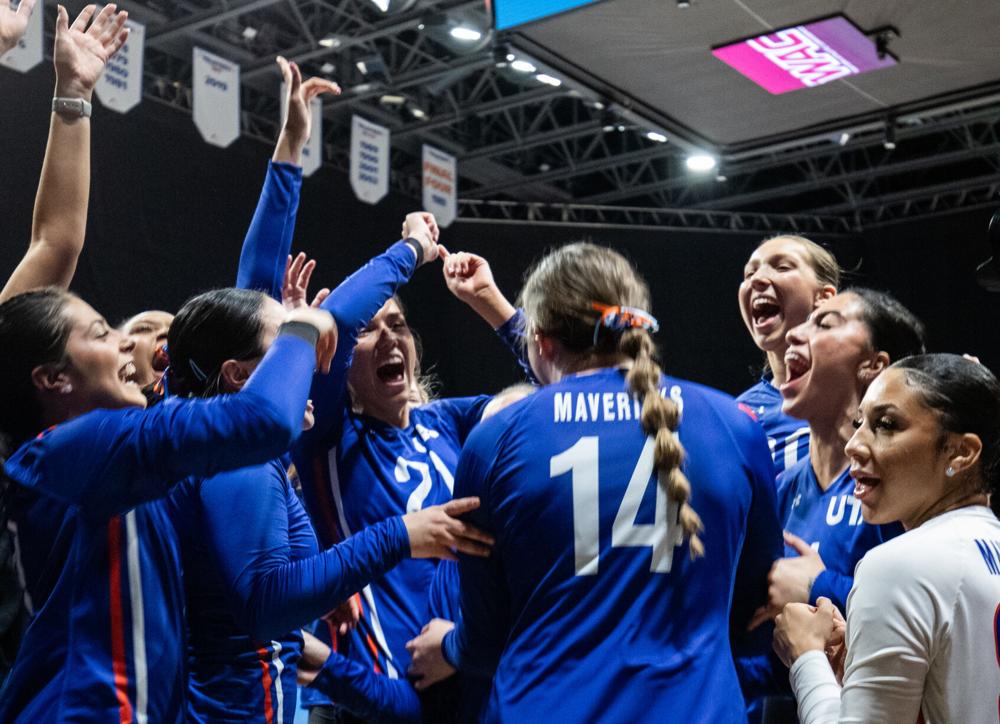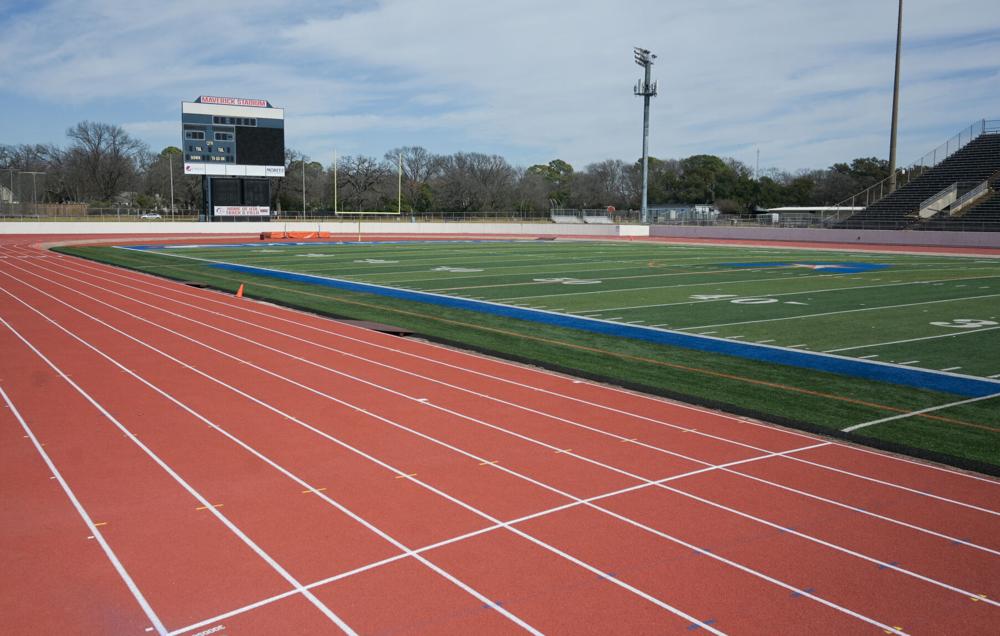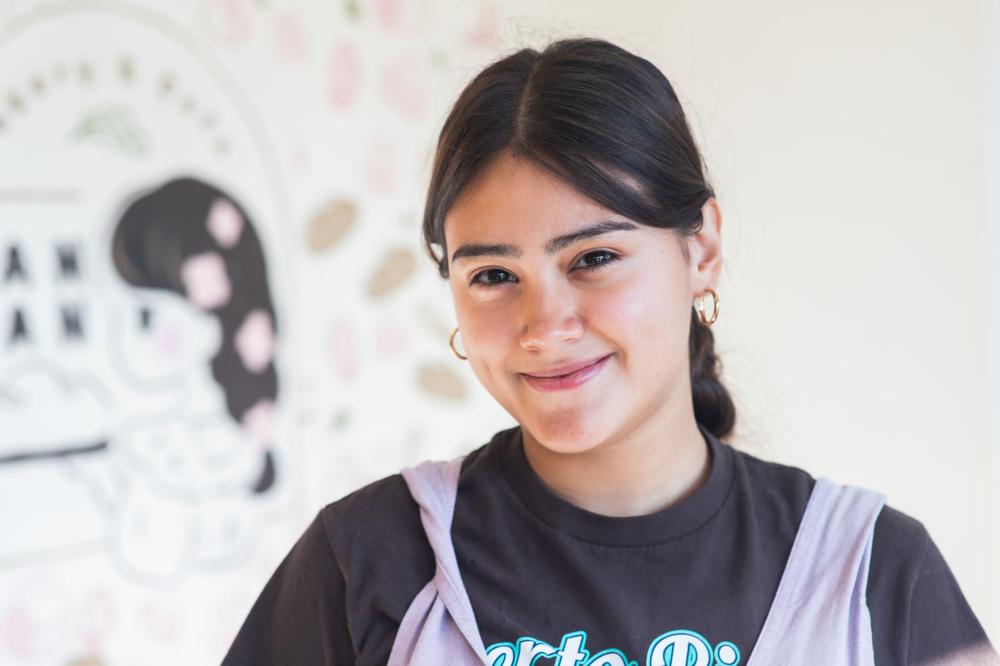Shorthorn News
 Activity Fair Day connects students and campus organizationsAs Mavericks walked through the University Center mall Wednesday, they were greeted by multiple organizations and clubs during the Activity Fair Day and Maverick Cookout. The event invited students to meet face-to-face with UTA organizations, departments and clubs, which showcased their services and involvement opportunities. This year, about 300 organizations and 10 vendors participated in the fair, said Tristian Brooks, student activities coordinator in the Office of Student Organizations. “It is proven that getting involved in a student organization helps with retention and overall satisfaction with having a good time at the university,” Brooks said. Chris Choi, president of the Korean Student Association, said the organization’s goal at the fair was to reach new Mavericks on campus and encourage students to join and enjoy themselves throughout the year. Choi said events like the activity fair are important because they give organizations a chance to introduce themselves without pulling students away from school. The event also gave the group a boost in recruitment. The UTA Wranglers are a spirit organization that supports Maverick athletic teams, said Jaysen Johnson. The Wranglers use the annual event to connect with new students and boost game attendance. Johnson said his favorite part of the fair was seeing all the different organizations and groups adding up every year and the diversity the campus offers. Ayehush Assefa said she attended the activity fair after she noticed students gathering and that she'd been wanting to learn more about UTA organizations. Assefa said she visited every table at the fair and found each group unique in its own way. “I love this so much. I think it’s very helpful, and I’m glad UTA is doing this,” she said. @samip.parajuli.54 news-editor.shorthorn@uta.edu
Activity Fair Day connects students and campus organizationsAs Mavericks walked through the University Center mall Wednesday, they were greeted by multiple organizations and clubs during the Activity Fair Day and Maverick Cookout. The event invited students to meet face-to-face with UTA organizations, departments and clubs, which showcased their services and involvement opportunities. This year, about 300 organizations and 10 vendors participated in the fair, said Tristian Brooks, student activities coordinator in the Office of Student Organizations. “It is proven that getting involved in a student organization helps with retention and overall satisfaction with having a good time at the university,” Brooks said. Chris Choi, president of the Korean Student Association, said the organization’s goal at the fair was to reach new Mavericks on campus and encourage students to join and enjoy themselves throughout the year. Choi said events like the activity fair are important because they give organizations a chance to introduce themselves without pulling students away from school. The event also gave the group a boost in recruitment. The UTA Wranglers are a spirit organization that supports Maverick athletic teams, said Jaysen Johnson. The Wranglers use the annual event to connect with new students and boost game attendance. Johnson said his favorite part of the fair was seeing all the different organizations and groups adding up every year and the diversity the campus offers. Ayehush Assefa said she attended the activity fair after she noticed students gathering and that she'd been wanting to learn more about UTA organizations. Assefa said she visited every table at the fair and found each group unique in its own way. “I love this so much. I think it’s very helpful, and I’m glad UTA is doing this,” she said. @samip.parajuli.54 news-editor.shorthorn@uta.edu Protesters rally against Arlington ICE recruitment fairDozens of protesters gathered outside Esports Stadium Arlington throughout Tuesday and Wednesday in response to a mass U.S. Immigration and Customs Enforcement hiring fair. The hiring event comes as part of ICE’s recent expansion initiative, which has continued ramping up nationwide, bolstered by revamped hiring benefits and patriot-centered marketing. The U.S. Department of Homeland Security also recently waived the age cap for new ICE applicants. The agency’s recruitment efforts reinforce preexisting tensions caused by President Donald Trump’s increased deportation rates and strong immigration policies. In January, Trump signed an executive order tightening immigration laws to remove illegal immigrants from the U.S. The order states that unlawful immigrants pose significant threats to national security and public safety. On Wednesday, several protesters came together in a lot across from the esports stadium, where they confronted and criticized attendees entering the venue for the ICE hiring. Eddie Delgado, Fort Worth Area Indivisible member, 44, said many people in the community are beginning to take a stand against the mass deportations. “We need to protect Black and brown people. We need to protect our communities, and we can't have this anymore,” Delgado said. “For them to hold a recruiting event to try to recruit 1,000 people in the DFW area, it's obvious what's about to happen in this area.” He also criticized ICE’s hiring incentives. “They can afford $50,000 sign-on bonuses, but they can't afford to pay for school lunches for kids. They can't afford health care for people. They're taking away Medicare,” Delgado said. Arlington resident Teresa Dunham, 65, like several others, shouted criticisms from across the street at attendees walking into the hiring fair. She called it “the walk of shame.” Dunham said ICE’s goal to expand is an intimidation tactic and that the agency is not following the proper legal process before taking people into custody. Antonio Rodriguez, Brown Berets NTX member, said the protest is for people to stand up to defend themselves and defend their human rights. “The time is now,” Rodriguez said. A counterprotester was also present in support of ICE, but declined to speak with The Shorthorn. ICE’s new initiatives gained funding through the One Big Beautiful Bill Act, which was signed into law in July. The act provides $165 billion to the Department of Homeland Security for causes such as hiring additional U.S. Customs and Border Protection personnel, increasing capacity at ICE detention facilities and funding ICE’s new hiring incentives. Over 80,000 people applied to join ICE in less than a week after the new incentives were announced, according to a Department of Homeland Security press release. The agency also recently began using Uncle Sam in recruitment posters, evoking imagery of World War I U.S. Army recruitment posters. One ad calls for former Department of Homeland Security workers to “return to mission.” “The amount of interest in working for ICE is unprecedented. We’ve never seen numbers like this before,” said acting ICE director Todd Lyons in a press release. “We’re looking to hire thousands of patriotic Americans who care about justice, accountability and the rule of law, and we know Arlington is a great place to start.” @PMalkomes @wall035203 news-editor.shorthorn@uta.edu
Protesters rally against Arlington ICE recruitment fairDozens of protesters gathered outside Esports Stadium Arlington throughout Tuesday and Wednesday in response to a mass U.S. Immigration and Customs Enforcement hiring fair. The hiring event comes as part of ICE’s recent expansion initiative, which has continued ramping up nationwide, bolstered by revamped hiring benefits and patriot-centered marketing. The U.S. Department of Homeland Security also recently waived the age cap for new ICE applicants. The agency’s recruitment efforts reinforce preexisting tensions caused by President Donald Trump’s increased deportation rates and strong immigration policies. In January, Trump signed an executive order tightening immigration laws to remove illegal immigrants from the U.S. The order states that unlawful immigrants pose significant threats to national security and public safety. On Wednesday, several protesters came together in a lot across from the esports stadium, where they confronted and criticized attendees entering the venue for the ICE hiring. Eddie Delgado, Fort Worth Area Indivisible member, 44, said many people in the community are beginning to take a stand against the mass deportations. “We need to protect Black and brown people. We need to protect our communities, and we can't have this anymore,” Delgado said. “For them to hold a recruiting event to try to recruit 1,000 people in the DFW area, it's obvious what's about to happen in this area.” He also criticized ICE’s hiring incentives. “They can afford $50,000 sign-on bonuses, but they can't afford to pay for school lunches for kids. They can't afford health care for people. They're taking away Medicare,” Delgado said. Arlington resident Teresa Dunham, 65, like several others, shouted criticisms from across the street at attendees walking into the hiring fair. She called it “the walk of shame.” Dunham said ICE’s goal to expand is an intimidation tactic and that the agency is not following the proper legal process before taking people into custody. Antonio Rodriguez, Brown Berets NTX member, said the protest is for people to stand up to defend themselves and defend their human rights. “The time is now,” Rodriguez said. A counterprotester was also present in support of ICE, but declined to speak with The Shorthorn. ICE’s new initiatives gained funding through the One Big Beautiful Bill Act, which was signed into law in July. The act provides $165 billion to the Department of Homeland Security for causes such as hiring additional U.S. Customs and Border Protection personnel, increasing capacity at ICE detention facilities and funding ICE’s new hiring incentives. Over 80,000 people applied to join ICE in less than a week after the new incentives were announced, according to a Department of Homeland Security press release. The agency also recently began using Uncle Sam in recruitment posters, evoking imagery of World War I U.S. Army recruitment posters. One ad calls for former Department of Homeland Security workers to “return to mission.” “The amount of interest in working for ICE is unprecedented. We’ve never seen numbers like this before,” said acting ICE director Todd Lyons in a press release. “We’re looking to hire thousands of patriotic Americans who care about justice, accountability and the rule of law, and we know Arlington is a great place to start.” @PMalkomes @wall035203 news-editor.shorthorn@uta.edu
Shorthorn Sports
 UT Arlington volleyball sweeps season-opening tournamentThe UTA volleyball team swept the Bradley Invitational Tournament on Friday and Saturday at the Renaissance Coliseum in Peoria, Illinois. In the tournament, the Mavericks took a 3-1 win over Quinnipiac University, a 3-2 win over Bradley University and a 3-2 win over Western Illinois University. These games were the first of the regular season for UTA, and the Mavericks began with a 3-0 record. Across the first two games, senior outside hitter Jalie Tritt led the way with 27 kills, followed by Sophie Ocampo, redshirt junior outside hitter, with 17 and freshman middle blocker Sophia Krichev close behind with 16. Also in the first two matches, Krichev had the most blocks of any Maverick, with 2 solo blocks and 8 block assists, followed by Alexis Bull, redshirt sophomore middle blocker, with 1 solo and 6 assists and junior setter Mira Ledermueller with 5 assists. Junior libero Samantha Glenn got 41 digs, the most for UTA, followed by 22 for Tritt and 19 for Ledermueller in the first two games. In the final match, the Mavericks took the lead early against Western Illinois University, winning the first set 25-17 and the second set 25-15. The Leathernecks mounted a comeback, winning both the third and fourth sets 25-23. UTA pulled out with a 15-11 win in set five to clinch the tournament sweep. The Mavericks continue their nonconference slate at the Cowgirl Classic starting Sept. 4 at Legacy Center in Lake Charles, Louisiana, where they’ll play the University of Louisiana Monroe, McNeese State University and Alcorn State University. @TyRoland06 sports-editor.shorthorn@uta.edu
UT Arlington volleyball sweeps season-opening tournamentThe UTA volleyball team swept the Bradley Invitational Tournament on Friday and Saturday at the Renaissance Coliseum in Peoria, Illinois. In the tournament, the Mavericks took a 3-1 win over Quinnipiac University, a 3-2 win over Bradley University and a 3-2 win over Western Illinois University. These games were the first of the regular season for UTA, and the Mavericks began with a 3-0 record. Across the first two games, senior outside hitter Jalie Tritt led the way with 27 kills, followed by Sophie Ocampo, redshirt junior outside hitter, with 17 and freshman middle blocker Sophia Krichev close behind with 16. Also in the first two matches, Krichev had the most blocks of any Maverick, with 2 solo blocks and 8 block assists, followed by Alexis Bull, redshirt sophomore middle blocker, with 1 solo and 6 assists and junior setter Mira Ledermueller with 5 assists. Junior libero Samantha Glenn got 41 digs, the most for UTA, followed by 22 for Tritt and 19 for Ledermueller in the first two games. In the final match, the Mavericks took the lead early against Western Illinois University, winning the first set 25-17 and the second set 25-15. The Leathernecks mounted a comeback, winning both the third and fourth sets 25-23. UTA pulled out with a 15-11 win in set five to clinch the tournament sweep. The Mavericks continue their nonconference slate at the Cowgirl Classic starting Sept. 4 at Legacy Center in Lake Charles, Louisiana, where they’ll play the University of Louisiana Monroe, McNeese State University and Alcorn State University. @TyRoland06 sports-editor.shorthorn@uta.edu Maverick Stadium to host Arlington ISD football gamesMaverick Stadium will host high school football games for Arlington ISD on Friday nights and select Thursday nights from Aug. 29 through Nov. 6. The decision to host the games comes as UTA continues its efforts to support and connect with the Arlington community, according to a UTA press release. "We are thrilled to open Maverick Stadium to Arlington ISD this fall," Jon Fagg, UTA Athletic Director, said in the release. "High school football is a cornerstone of Texas culture, and we want to give players, families, and fans an unforgettable experience while showcasing our beautiful campus." AISD features six high schools, three of which are scheduled to play at the campus' recently updated stadium, including Martin High School, Bowie High School and Arlington High School. Arlington is slated to be the first team to play in Maverick Stadium as they take on Mesquite High School in their season opener at 7 p.m. Aug. 29. With high school football being a cornerstone of Texas, Fagg said he hopes hosting AISD games will inspire young athletes and strengthen UTA’s connection to the city of Arlington. Game attendees will also get to experience Maverick Stadium’s recently upgraded scoreboard, which was installed in February. This isn't the first time AISD has used Maverick Stadium for events. In 2024, the stadium hosted the Dean Corey Marching Extravaganza, which was previously held at Lamar High School until it could no longer seat all guests. The Maverick Stadium’s uses have come and gone, but it has stood firm as the home of UTA’s track and field team since its opening in 1980. Along with the scoreboard, the track itself also received a renovation. @diegocllazo sports-editor.shorthorn@uta.edu
Maverick Stadium to host Arlington ISD football gamesMaverick Stadium will host high school football games for Arlington ISD on Friday nights and select Thursday nights from Aug. 29 through Nov. 6. The decision to host the games comes as UTA continues its efforts to support and connect with the Arlington community, according to a UTA press release. "We are thrilled to open Maverick Stadium to Arlington ISD this fall," Jon Fagg, UTA Athletic Director, said in the release. "High school football is a cornerstone of Texas culture, and we want to give players, families, and fans an unforgettable experience while showcasing our beautiful campus." AISD features six high schools, three of which are scheduled to play at the campus' recently updated stadium, including Martin High School, Bowie High School and Arlington High School. Arlington is slated to be the first team to play in Maverick Stadium as they take on Mesquite High School in their season opener at 7 p.m. Aug. 29. With high school football being a cornerstone of Texas, Fagg said he hopes hosting AISD games will inspire young athletes and strengthen UTA’s connection to the city of Arlington. Game attendees will also get to experience Maverick Stadium’s recently upgraded scoreboard, which was installed in February. This isn't the first time AISD has used Maverick Stadium for events. In 2024, the stadium hosted the Dean Corey Marching Extravaganza, which was previously held at Lamar High School until it could no longer seat all guests. The Maverick Stadium’s uses have come and gone, but it has stood firm as the home of UTA’s track and field team since its opening in 1980. Along with the scoreboard, the track itself also received a renovation. @diegocllazo sports-editor.shorthorn@uta.edu
Shorthorn Life & Entertainment
 The Weeknd, Texas Rangers and Theatre Arlington in this week's To-Do ListFrom The Weeknd to the Texas Rangers, residents have plenty of events to attend in Dallas-Fort Worth this week. Sports Witness the Dallas Wings take on the Seattle Storm at 6:30 p.m. Friday at College Park Center. Tickets start at around $24. Catch the Texas Rangers bat it out with the Cleveland Guardians at 6:05 p.m. Saturday at Globe Life Field. The first 20,000 fans can get an Adrián Beltré replica statue. Tickets start at $27.85. Entertainment Watch “I’m Proud of You,” a play adapted from the book “I’m Proud of You: My Friendship with Fred Rogers” by Tim Madigan, at 2 p.m. Sunday at Theatre Arlington. The play showcases male friendship at its finest and most powerful. Tickets start at $38 for adults. Students can purchase tickets for $5 15 minutes before curtain with their current student ID. Experience the Quinceañera Expo from noon to 5 p.m. Sunday at Esports Stadium Arlington. Meet vendors, explore products and services, and enjoy a live fashion show featuring the latest quinceañera trends and styles. Tickets are $12. Quinceañeras and kids under five enter free. Enjoy the Bookish Bazaar from 10 a.m. to 2 p.m. Sunday at Inclusion Coffee. Explore an array of vendors offering everything from rare finds to cozy reads while sipping a beverage. Music See The Weeknd: After Hours Til Dawn tour at 7 p.m. Wednesday at AT&T Stadium. The concert features Playboi Carti and special guest Mike Dean. Tickets start at about $57 and can be purchased online. @ATClements03 news-editor.shorthorn@uta.edu
The Weeknd, Texas Rangers and Theatre Arlington in this week's To-Do ListFrom The Weeknd to the Texas Rangers, residents have plenty of events to attend in Dallas-Fort Worth this week. Sports Witness the Dallas Wings take on the Seattle Storm at 6:30 p.m. Friday at College Park Center. Tickets start at around $24. Catch the Texas Rangers bat it out with the Cleveland Guardians at 6:05 p.m. Saturday at Globe Life Field. The first 20,000 fans can get an Adrián Beltré replica statue. Tickets start at $27.85. Entertainment Watch “I’m Proud of You,” a play adapted from the book “I’m Proud of You: My Friendship with Fred Rogers” by Tim Madigan, at 2 p.m. Sunday at Theatre Arlington. The play showcases male friendship at its finest and most powerful. Tickets start at $38 for adults. Students can purchase tickets for $5 15 minutes before curtain with their current student ID. Experience the Quinceañera Expo from noon to 5 p.m. Sunday at Esports Stadium Arlington. Meet vendors, explore products and services, and enjoy a live fashion show featuring the latest quinceañera trends and styles. Tickets are $12. Quinceañeras and kids under five enter free. Enjoy the Bookish Bazaar from 10 a.m. to 2 p.m. Sunday at Inclusion Coffee. Explore an array of vendors offering everything from rare finds to cozy reads while sipping a beverage. Music See The Weeknd: After Hours Til Dawn tour at 7 p.m. Wednesday at AT&T Stadium. The concert features Playboi Carti and special guest Mike Dean. Tickets start at about $57 and can be purchased online. @ATClements03 news-editor.shorthorn@uta.edu Pan-demonium in Arlington area: Bakery draws hour-long lines for Mexican-Japanese treatsBy the time Laura Molinar arrives at PanPan Bakery and Cafe, she has been up almost all night researching how to adapt to the business’s skyrocketing attention. Molinar’s bakery on Roosevelt Drive in Dalworthington Gardens, Texas, about four miles from UTA, sees hundreds of customers line up around the building waiting for Mexican-Japanese fusion desserts such as milk bread conchas, salted butter rolls and horchata matcha — on a weekday. The success didn’t come overnight. PanPan Bakery and Cafe opened a year ago Sunday, but Molinar’s videos on social media documenting daily work and promoting products have propelled the business to new heights. A TikTok explaining PanPan’s decoration and products — also explaining that pan means bread in both Japanese and Spanish — has been viewed more than 17 million times since it was posted in early August. “I was already kind of settling into the flow of things, but now this explosion of new people has kind of resparked something in me for sure,” Molinar said. “A lot of inspiration.” To handle the newly found fame, bakers arrive at 3:30 a.m. to prepare about 800 loaves of bread for the morning sales. They don’t leave until around 11 a.m. “Our day is making bread, making bread and making bread,” said Andrew Wolgast, a barista and baker at the store. Molinar works at the bar or in the kitchen throughout the day depending on needs. She arrives early in the morning to check the prep work and whether the bakery will be set for the next day. “If people are coming from far away, people coming from Georgia, they're coming from Tennessee, they're coming from California, they're coming from Korea, and they deserve the utmost service,” Molinar said. PanPan provides customers waiting in line with water and umbrellas to combat the Texas summer heat. Molinar also greets customers throughout the day, she said. “They do take that valuable time out of their day, spend their hard-earned money to support my business directly. It only feels right that I go up to them directly and thank them for it,” she said. While the store typically closes at 3 p.m., Molinar serves customers who are in line by closing time. That means two extra hours of work. By the time UTA alumna Jaqueline Reca sits down and tastes the Mexican chorizo stuffed in Japanese milk bread, she has waited in line for more than an hour. She visited PanPan after seeing the place on social media. Reca takes a bite, nods and wiggles in enjoyment. “It’s worth the wait,” she said. Molinar credits the inspiration for Mexican-Japanese fusion to anime being a huge part of Mexican culture and to her background growing up in Los Angeles, where she learned to enjoy different cuisines. At PanPan, the matcha is sourced straight from Japan, Molinar said, and the coffee beans come from Mexico. As their beverages arrived, Fort Worth residents Sarahy Meza and Ashley Perez didn’t forget to snap photos before taking a sip. “Wait, that’s really good!” Perez said as she enjoyed a banana cream matcha. Meza dubbed Perez the “matcha queen” and said her friend convinced her to try matcha at different places. They waited at PanPan for over an hour but are happy that they live nearby. “We drive far, far for matcha, so knowing that this is close, we’re going to be here every day for real,” she said. Molinar enjoys seeing people wrapped around the block for her desserts, she said. Her plans for PanPan include extending its hours and growing beyond one location. But dreaming can wait. It’s time to open, and her second group of bakers has arrived. Her baristas arrived about an hour ago. She opens the door at 9 a.m. The line of patrons stretches around the block, and they’re ready for pan. @DangHLe news-editor.shorthorn@uta.edu
Pan-demonium in Arlington area: Bakery draws hour-long lines for Mexican-Japanese treatsBy the time Laura Molinar arrives at PanPan Bakery and Cafe, she has been up almost all night researching how to adapt to the business’s skyrocketing attention. Molinar’s bakery on Roosevelt Drive in Dalworthington Gardens, Texas, about four miles from UTA, sees hundreds of customers line up around the building waiting for Mexican-Japanese fusion desserts such as milk bread conchas, salted butter rolls and horchata matcha — on a weekday. The success didn’t come overnight. PanPan Bakery and Cafe opened a year ago Sunday, but Molinar’s videos on social media documenting daily work and promoting products have propelled the business to new heights. A TikTok explaining PanPan’s decoration and products — also explaining that pan means bread in both Japanese and Spanish — has been viewed more than 17 million times since it was posted in early August. “I was already kind of settling into the flow of things, but now this explosion of new people has kind of resparked something in me for sure,” Molinar said. “A lot of inspiration.” To handle the newly found fame, bakers arrive at 3:30 a.m. to prepare about 800 loaves of bread for the morning sales. They don’t leave until around 11 a.m. “Our day is making bread, making bread and making bread,” said Andrew Wolgast, a barista and baker at the store. Molinar works at the bar or in the kitchen throughout the day depending on needs. She arrives early in the morning to check the prep work and whether the bakery will be set for the next day. “If people are coming from far away, people coming from Georgia, they're coming from Tennessee, they're coming from California, they're coming from Korea, and they deserve the utmost service,” Molinar said. PanPan provides customers waiting in line with water and umbrellas to combat the Texas summer heat. Molinar also greets customers throughout the day, she said. “They do take that valuable time out of their day, spend their hard-earned money to support my business directly. It only feels right that I go up to them directly and thank them for it,” she said. While the store typically closes at 3 p.m., Molinar serves customers who are in line by closing time. That means two extra hours of work. By the time UTA alumna Jaqueline Reca sits down and tastes the Mexican chorizo stuffed in Japanese milk bread, she has waited in line for more than an hour. She visited PanPan after seeing the place on social media. Reca takes a bite, nods and wiggles in enjoyment. “It’s worth the wait,” she said. Molinar credits the inspiration for Mexican-Japanese fusion to anime being a huge part of Mexican culture and to her background growing up in Los Angeles, where she learned to enjoy different cuisines. At PanPan, the matcha is sourced straight from Japan, Molinar said, and the coffee beans come from Mexico. As their beverages arrived, Fort Worth residents Sarahy Meza and Ashley Perez didn’t forget to snap photos before taking a sip. “Wait, that’s really good!” Perez said as she enjoyed a banana cream matcha. Meza dubbed Perez the “matcha queen” and said her friend convinced her to try matcha at different places. They waited at PanPan for over an hour but are happy that they live nearby. “We drive far, far for matcha, so knowing that this is close, we’re going to be here every day for real,” she said. Molinar enjoys seeing people wrapped around the block for her desserts, she said. Her plans for PanPan include extending its hours and growing beyond one location. But dreaming can wait. It’s time to open, and her second group of bakers has arrived. Her baristas arrived about an hour ago. She opens the door at 9 a.m. The line of patrons stretches around the block, and they’re ready for pan. @DangHLe news-editor.shorthorn@uta.edu


